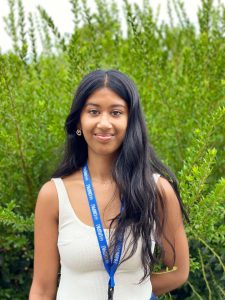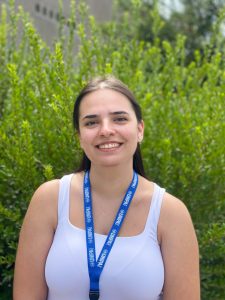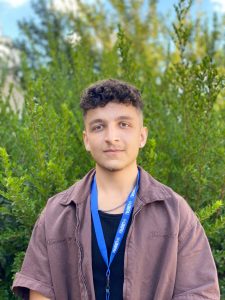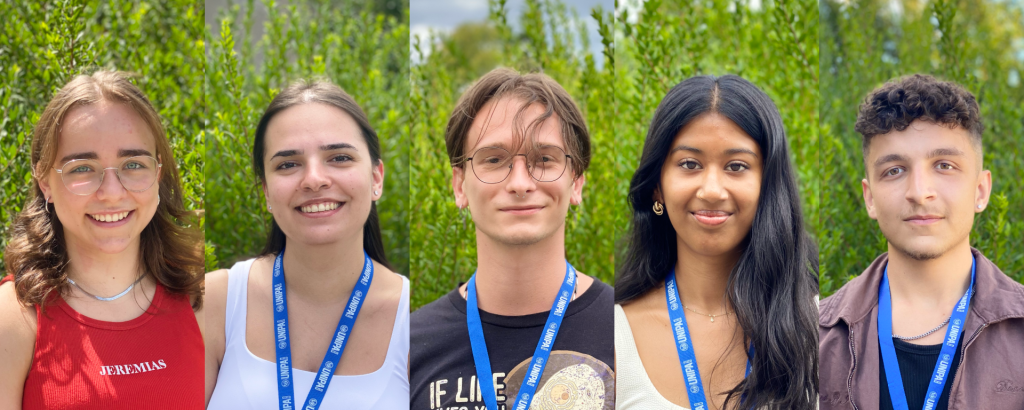
Portraits of the 2025 Summer School in Palermo
 Verified listing
Verified listing
- News
- prev
- next
- prev
- next
News article
Adithya Vallipuram
Bachelor student, Biotechnology, HES-SO Life Sciences
What are your study and research interests?
I’m interested in biomedical research, for example neuroscience. I also did a one-year practicum relating to ocular health. Modification of stem cells is another interest.
Why did you decide to attend the summer school?
The summer school allows us to study at another site and to discover different areas of research that we don’t have at our school. For example, we’re very strong at bioprocess engineering at HES-SO, while here in Palermo I discovered some organ-on-chip technologies from other schools. It’s also nice to travel with classmates to a warm destination!
Do you have a favourite talk or session so far?
The first session focused on organ-on-chip has been my favourite so far. The second speaker, Riccardo Barrile, did an excellent job of introducing the subject.
What are your plans after you complete your bachelor’s degree?
I’m working on stem cells at a hospital now as part of my bachelor thesis. It’s possible that I’ll continue working there after I graduate. It would be ideal to find an internship that I can combine with getting a master’s degree. I think I’ll stay in Sion to do my master; there are a lot of companies in the valley (Wallis / Valais) here. The lifestyle in our region is calm and relaxed, which I enjoy.
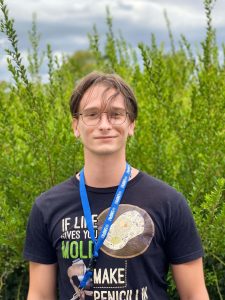
Alessandro Bruno
Master student, Industrial Biotechnology, University of Palermo
What is the master program like at Palermo?
The first year is theoretical, mostly based in the classroom. The second year is dedicated to thesis work for a period of 10 months. We have the opportunity to complete our thesis abroad at the FHNW or HES-SO Life Sciences, thanks to exchange agreements between our universities. The University of Palermo also has ties to the ISMETT hospital and National Research Council (CNR) in Palermo.
What are your research interests?
I would like to concentrate on molecular biology, specifically on non-coding RNA or regenerative medicine.
Is this the first time you’re participating in the summer school?
Yes! My professors and colleagues from last year told me about the 2024 edition in Wädenswil. They advised me to participate in the 2025 edition here. It is an excellent opportunity to meet professors from other schools, some industrial companies and sponsors and network.
What is your favourite talk so far?
My two favourite talks were:
- Professor Simona Campora, University of Palermo: 3D tumor models for cancer
- Giovanni Zito, ISMETT. From 2D to 3D models: new tools to study liver diseases
In the area of regenerative medicine, is there a specific organ you’re most interested in?
I would like to work on retina regeneration using Zebra fish models. Zebra fish models can also be used for other applications, for example to study tumours. Mesenchymal stem cells are another area I’m intererested in, like Professor Cavalieri’s work on cell-free therapy with the secretome of stem cells. We have a big lab in Palermo specialized in Zebra fish.
What are your plans after you finish your master?
I would like to complete a PhD in Molecular Biology, maybe focused on Zebra fish models. Many senior researchers in Sicily have recommended that I go outside Italy to do my PhD. This way I can return with a strong CV that can be presented to industry and build a good career. But I haven’t picked a school or a place yet.
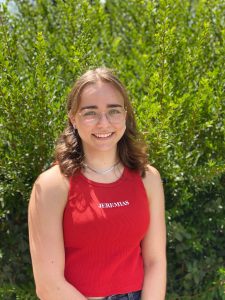
Emma Heinzle
Bachelor student, Biotechnology, Management Centre Innsbruck
Tell me about the bachelor and master programs at MCI.
In the Bachelor of Biotechnology at MCI, we have the option in our third year to focus on either food tech or biotech. But regardless of which specialization we pick, we can continue to the Master of Biotechnology – because many of the prerequisite courses at the bachelor level provide the same knowledge base. I’m starting my third-year bachelor, and I think I will pick the biotech concentration, but food tech also interests me!
What are your study and research interests?
The reason I chose to study biotechnology is my fascination with genetics. I might decide to deepen my knowledge in that field in the next two years and head toward biomedical or pharmaceutical applications. At the same time, we just had an introduction to food technology and what falls in that category and that was quite interesting. My decision between the two will depend on how the next semester goes.
Why did you decide to participate in the summer school?
I thought it would be a cool opportunity to get to know new people and make connections. The friendships we make here can lay the foundation for seeing each other at future conferences and following each other’s research and careers over the years. I might reach out to participants I met here when I have questions on specific topics.
What was your favourite talk so far?
I enjoyed the entire session about nanomedicine and cancer therapy because I felt all three speakers presented complementary angles:
- Oya Tagit, FHNW. Translating cancer immunotherapy nanomedicines from lab to clinic.
- Simona Campora, University of Palermo. 3D tumor models for cancer research
- Patrick Shahgaldian, FHNW. Functional Nanomedicine Through Enzyme Supramolecular Engineering.
What are your plans after you complete your bachelor’s degree?
Ideally I would start my master’s studies right after. But if I find an interesting internship, I might work in industry for a year before starting the master’s degree. It will also depend what my colleagues decide and if we want to ‘follow’ each other as a cohort to the master's.
Is there a specific company you’d like to do an internship at?
Yes, I have a couple of ideas. There is a paint and dye company in Innsbruck that has strong ties to our school – who knew how much science goes into making something as ‘simple’ as paint! I will definitely apply for an internship there. Novartis is another possibility if I want to go more the pharmaceutical / genetics route.
Sonja Bojic
Bachelor student, Biotechnology, ZHAW
Tell me about the bachelor programs at ZHAW.
After three semesters of introductory courses, we pick either a biological or technological specialisation in the fourth semester. In the fifth semester we can add a minor.
What are your study and research interests?
In high school, I trained to work in the healthcare sector. My interest in life sciences led me to go back to school at ZHAW to major in biotechnology. I selected the technological specialisation, which I know less about, to balance out my knowledge of biology, which I already have a good background in. We’re discussing things like the engineering aspects of setting up biomanufacturing facilities, how monitoring technologies are integrated and what kinds of data are monitored. As a minor, I picked analytics and diagnostics, which also keeps me connected to my healthcare background. In the end I think I’ll be headed toward pharmacology, but with so many interesting professors and projects, it’s hard for me to say exactly where I’ll land.
Why did you decide to participate in the summer school?
The summer school is quite famous at the ZHAW – Jack always does a good job of getting us excited about it. I wanted to get to know students from other schools, in Switzerland and internationally, find out what they study, what they will specialise in, and how they envision their future careers. Plus, the talks from lecturers are highly diverse, it’s fascinating to see all the different applications of biotechnology and helps orient me.
What was your favourite talk so far?
Today’s cancer research session was great and closely matches my interests. I’m also looking forward to tomorrow’s sensor and diagnostics session.
What are your plans after you complete your bachelor’s degree?
I will either do my master’s at ZHAW right after or go to industry to work a bit first. I’m very happy with the quality of education at ZHAW, I like the profs and the location, so I would continue here. Our profs have such good connections to industry, both in their past work experience and current collaborative research projects – it’s an asset for us students.
Alessio Fiore
Bachelor student, Bioanalytics and Cell Biology, FHNW
Why did you decide to study bioanalytics and cell biology?
Already as a child, I was fascinated by the mechanisms of life. In high school, I did an apprenticeship as a biology lab technician, which I really enjoyed. I knew I was on the right path and decided to continue to a bachelor’s degree at the FHNW in this area. For my bachelor thesis, I would like to do something with biochemistry. This ties in cell biology as well as other chemical factors that play a role.
Why did you decide to participate in the summer school?
It’s funny, I had no idea it existed and was sick the week when it was advertised at the FHNW. Thankfully a colleague told me about it and asked me to join her! Then I checked out the program and was like – this looks really fun! I’ll be able to make connections to students and lecturers from other schools. Plus I’m of Italian background and it’s an amazing opportunity to exchange with the Italian profs and students here.
What was your favourite talk so far?
I enjoyed Dominik Meinel’s talk Harnessing focal molography for affinity and concentration measurements of proteins in complex matrices. I’m interested in doing my bachelor’s thesis with him. But, more than any one talk alone, what I appreciated the most was the diversity of all talks presented. I could really feel that after two years of studying at the FHNW, I was able to understand something from each presentation – this would not have been possible straight out of my apprenticeship.
What are your plans after you complete your bachelor’s degree?
I see two paths for my life, and both are directly related to doing a master’s degree. I’m interested in doing a double master's degree at FHNW in combination with Linköping University in Sweden, then going onto doing a PhD. But if I decide I don’t want to do a PhD, then I will apply at the University of Zürich and the ETH Zürich to do my master’s.
Published
- 15 September 2025
